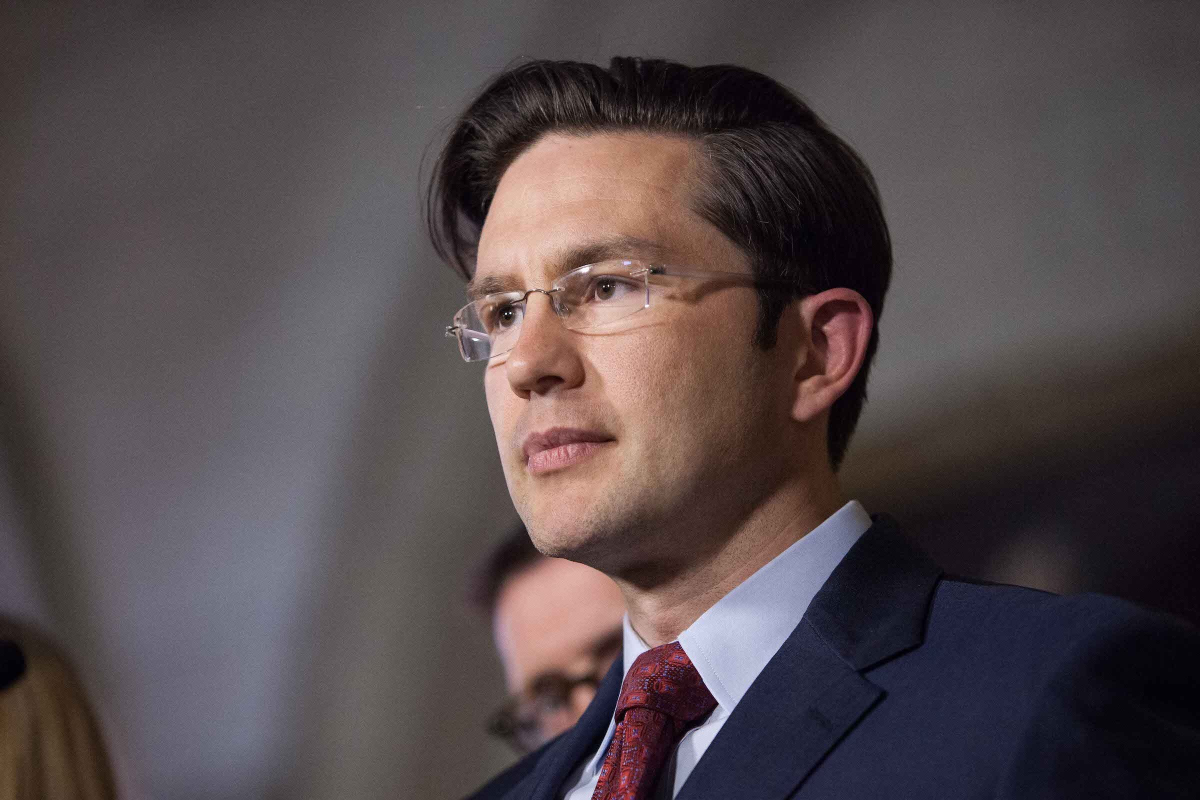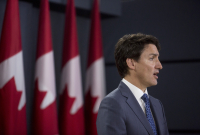Support strong Canadian climate journalism for 2025
Pierre Poilievre has made a name for himself by taking a strong stance on issues many Canadians find divisive. His steadfast support of the so-called “Freedom Convoy” and other related groups, including participation in a march with a prominent anti-vaccine-mandate figure, have made him a fixture in headlines and a controversial political figure.
Now, his tactic of leveraging divisive, polarizing issues has catapulted Poilievre into position as front-runner in the Conservative Party of Canada’s leadership race, says one political scientist.
The Carleton MP’s politics revolve around “riling up the base” using “highly partisan rhetoric,” and it appears this strategy is paying off, Max Cameron, a professor of political science at the University of British Columbia, told Canada’s National Observer.
Fifty-seven per cent of Conservative voters have a favourable impression of Poilievre, according to an Ipsos poll conducted on behalf of Global News between Aug. 29 and 31. A sample of 1,001 Canadians aged 18 and over were interviewed for the survey, which saw Poilievre’s popularity climb eight points compared to a similar poll conducted in mid-July. Jean Charest is viewed favourably by 38 per cent of Conservative voters, down seven points, and MP Leslyn Lewis sits at 32 per cent.
The results of the leadership race are to be announced Sept. 10. Besides Poilievre, Charest and Lewis, former Ontario MPP Roman Baber and Conservative MP Scott Aitchison are also in the running.
Poilievre made headlines in recent weeks after a photo surfaced of him shaking hands with Jeremy Mackenzie, founder of a far-right group known as Diagolon, This is one of many controversial moments for the leadership candidate that has elicited both support and outrage from Canadians.
Poilievre did not respond to requests for comment by deadline.
Because politicians meet lots of people, Cameron said he is cautious about making inferences around photos, but noted Poilievre’s divisive strategy is premised on mobilizing a “group of supporters who really are passionate about some change that they want to see.”
On June 30, Poilievre also marched alongside James Topp, a Canadian soldier charged after speaking out against COVID-19 vaccine requirements while in uniform. Topp, who marched from Vancouver to Ottawa to protest COVID-19 vaccine mandates, has also appeared on Mackenzie’s podcast.
Vaccine mandates have been a key aspect of Poilievre’s messaging, and he even used the so-called “Freedom Convoy” that occupied downtown Ottawa for more than three weeks to shoot a promotional video.
His support of the convoy is not unique. Other MPs have taken the same stance, and some, including fellow leadership candidate Lewis, met with Topp and other key convoy organizers.
In Poilievre’s promotional video, he said the convoy represents "the people who want to stand and speak for their freedoms" and "those that our government and our media have insulted and left behind."
This summer, Poilievre has also decried the work of journalists and the mainstream media. On May 9, Poilievre tweeted that he won seven elections by going around liberal media and speaking “directly to Canadians.”
His campaign put out a statement in response to questions posed by a Global News reporter, referring to the questions as “an attack” and accusing “unprofessional journalists” of trying to set “disingenuous traps” to attack opponents.
Anti-vaccine-mandate attitudes, meeting with far-right organizers or skipping a debate are nothing new for the Conservative Party, but Cameron said Poilievre’s opposition to the World Economic Forum is unusual.
“Historically, that's been the sort of thing that Conservatives have embraced,” he explained. “[Former prime minister Stephen] Harper would go to those, and they're sort of a staple of the kind of corporate view of the world.
“It's not unusual to see people on the left criticizing the World Economic Forum … but for somebody on the right to criticize it, that tells us that there's a big pivot happening in the Conservative movement.”
Poilievre has established himself as a Conservative “bulldog” through these types of defining moments, but his legislative track record also speaks volumes, said Cameron.
“Back in 2014, he, as a member of the Harper government, was instrumental in introducing a series of changes to the Canada Elections Act,” Cameron explained.
The proposed changes (none of which are in place today) sought to impose a set of restrictions on voting, change campaign finance rules, raise the bar on voter identification, eliminate vouching and limit Elections Canada’s ability to enforce the Elections Act and the activities it could undertake to encourage participation, he said.
A group of more than 150 political scientists, including Cameron, voiced concerns about the proposed changes. He says this was one of the rare times a majority of the political science community spoke with a unified voice.
“That was my first sense of who Pierre Poilievre is, and it struck me that this was the kind of partisanship and politicization of electoral institutions that we have been seeing down south, and we know what the consequences of that kind of politicization are,” said Cameron.
To Cameron, Poilievre’s record on this issue as minister of state for democratic reform suggests his vision for Canada’s democracy is not inclusive, doesn’t encourage the broadest possible participation and doesn’t honour and respect non-partisan institutions.
“Then you add on to that, you know, the pandering to the truckers convoy, and so forth. And I think that the picture becomes pretty clear.”
Typically, Conservative leadership candidates draw support from the right during leadership contests and then tack towards centre for federal elections to appeal to a wider voter base, like former leader Erin O’Toole did before being ousted, said Cameron. But if he wins, Poilievre may be the exception, he said.
It’s impossible to know what strategies are unfolding in Poilievre’s camp, but “part of his appeal to his base, at least, is the perception that he actually means what he says,” and with strong stances on divisive issues, it would be hard to walk back, said Cameron.
If he wins the leadership contest, Cameron thinks it’s likely Poilievre will stick to his guns and strong reputation as a Conservative “bulldog” in the hopes it's enough to win a federal election.
Natasha Bulowski / Local Journalism Initiative / Canada’s National Observer






Comments
Anyone who associates and supports law breakers does not belong in parliament. Anyone who associates and supports anti-vaxxers needs to go back to school or listen to medical professionals. Anyone who votes for this man is not supporting democracy.
Oh, oh, pick me! I know, I know! He did everything T**** did (or certainly seems like he wants to be on that path), and then blamed Trudeau and the Liberals for it. Right? Did I get the answer right?
p.s. "Poilievre’s opposition to the World Economic Forum is unusual." No, it's not so weird when you consider that the WEF has become the butt of several new conspiracy theories. (North America is swimming -- or, more accurately, drowning -- in its own media illiteracy, scientific illiteracy, ecological illiteracy, climate change illiteracy, and lack of critical thinking skills. So when WEF's Klaus Schwab wrote about a "great reset" -- using Covid as the opportunity to stop doing so many things that are killing us -- the conspiracy nuts had a heyday.)
Until PP points out that there is actually one grand conspiracy afoot (between Big Oil, Big Banks, Big Meat, Big Auto ... and the puny little governments in their back pockets ... to keep us on the path to climate breakdown and chaos for the sake of money, profit, greed and control), we know he's a fake who's just in it for the celebrity and power.
So, as I said above, mimicking T****, PP just jumped on the latest conspiracy bandwagon and made it his own. How is he ever going to keep driving so many bandwagons?
Ha ha, good point about the difficulty in "driving so many bandwagons."
Also good points about people drowning in all the "illiteracies," starting with fundamental illiteracy, and what the ACTUAL conspiracy is.
Boilievre's despicable record with the "Unfair Elections Act" makes him more than just "Republican adjacent" but a lot of people don't know about that, or that Harper's cons are responsible for the very first attack ad in Canada. I hope the media starts to actively insert such vital context at every turn since that's a possible solution when drowning in all this dis/misinformation. For example, I just read that Liz Truss was an economist for Shell and plans to lift the ban on fracking, which seems hugely relevant but in watching news regularly lately I don't recall seeing that telling information anywhere...
The problem for "moderate" Conservatives is that they have only one policy plank and it's largely dead. That is, they're for neoliberal policies a la free trade, small government, privatization and stuff. There are two problems with this. First, they already won on that; we have free trade, government has been shrunk, way too much stuff has been privatized. Plus their main competition, the Liberals, basically went along with those ideas long ago, so it's not a differentiator. Saying you're for that stuff is almost like saying nothing. From the media perspective, it's boring stuff they can't really pull an audience with.
And second, it has become ever more clear that this one plank is a terrible idea; in an inchoate sort of way, even most Conservative voters don't believe in that stuff any more. Many Conservatives, for instance, are all about protectionism to keep jobs in the country.
So basically, old school conservatives have no message--or, to the extent they have one, it's "We're for the stuff that everyone already does, so there's no point electing us, and it's the stuff that got us into this mess, so there's REALLY no point electing us!"
That puts the whackjob semi-fascist Conservatives in a great position: Their message is false, nonsensical and evil, but it IS a message, and it makes for TV that can pull an audience.
The real problem is that the Liberals don't have much of a message either. "Unlike them, we're not very evil" is uncompelling.
The radicalized far-right faction now ascending in the nominal conservative federal party effectively gives centrists (including the centre-right which the Liberals have basically occupied) the differentiation they need: protect democracy, protect sovereignty, protect social service, etc.
I agree that traditional Toryism is protectionist. No greater indication that neoliberalism was commandeering the Tory party was Mulroney’s Free Trade deal, decommissioning of railways, and gutting of unemployment insurance. But the coup de grace was Harper’s CPC which isn’t Tory at all but rather dupes real conservative-minded citizens to vote for it.
Nevertheless, many Tories rejected the Firewall Fiend on principle while many more gradually joined them in vacating the new party. But the real divide happened after the HarperCons were defeated and the CPC creator resigned. The immediate lunge to the right began a palpable exodus that has registered in the CPC’s deceasing ability to win elections—three in a row, now.
Poilievre is going to accelerate this schism.
I don’t think old-style Tories are ready to creat a new party yet—not as long’s the CPC is in the running. They would probably even wait for a good thrashing to try to win the party back and pull it back toward the centre. But I don’t think the CPC is redeemable.
The CPC could end up like the kind of remora that the NDP traditionally has been: a third or fourth or fifth-place party that prays for minorities and the chance to hold the balance of power. As the Liberals exploit ideological terrain abandoned by the CPC, the NDP might become its main rival.
Very nicely expressed, thank you
Like the Conservative Party in B.C. which is minor because the Liberals are the actual conservatives there? Lines seem to be blurring more rapidly than usual distilling us all down to progressive or NOT.
All true, and again we're all immersed in the information quicksand of the internet where a lie really does travel around the world twice before the truth even shows up making it an anachronism or some kind of fetish. So people's attention has never been more capricious at a time when it's never been more important. All that's left to us is to work that fetish I'd say, for all that it's worth.
And one of the glaring truths is that "evil" simply does NOT apply to the Liberals (bothsidesim again, the ultimate triumph of the conservatives, skewing perspective) but DOES to the cons. Boilievre is a living, breathing example and he's left himself WIDE open. I sure hope he "wins" today....
Like Scheer, O'Toole, and now Pollievre, the very last thing we need in Canada is a PM or Party Leader who thrives on polarization and conspiracies. What happened to conservatism? I would never vote for any of them but living in rural Alberta, my vote usually doesn't count anyway
The rural vote traditionally and historically defines the more tribal Alberta though does it not? One generalization about the current polarization in politics attributes it to broad attitudinal differences between rural and urban and Alberta can be compared to the States with gun control for example where the majority is actually urban and against much of the current right wing platform. Maybe more of the population here has become apolitical and indifferent after decades of conservatives in power because alienating voters IS a common right wing tactic. They're the card-carrying anti-democracy bunch.
Hopefully the jig is up here with the extreme Danielle Smith going for broke by flirting with separatism when a referendum would reject it outright.